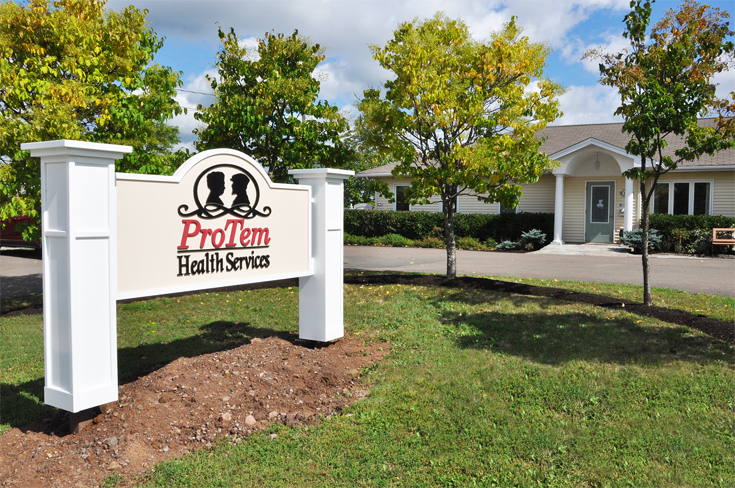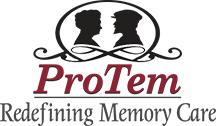About Dementia
Learn about the different types of memory diseases we specialize in at ProTem.
Creutzfeldt-Jakob Disease (CJD)
To talk about Creutzfeldt-Jakob disease we need to first address the human prion diseases.
Human Prion Diseases (one of which is Creutzfeldt-Jakob disease) are a group of rare diseases where the brain cells deteriorate over time. These diseases are classified by their cause, and different symptoms and the course of illness.
Genetic Prion Disease
The genetic form of this disease is caused by an abnormal prion protein gene that’s passed down from parent to child. Usually, people are aware if prion disease is in their bloodline. We call this an Autosomal Dominant version of prion disease because if someone has the abnormal gene, there is a 50% chance whether each of their children will inherit it.
Having said that, there are actually some people who’ve been diagnosed without knowing the gene abnormality was in their family. To find out if there is evidence of an inherited disease requires a blood test so the gene can be analyzed.
Genetic Prion Disease is very rare. For perspective, the UK’s population is about 62 million…and only a few a year die there from genetic prion disease.
So let’s talk about the 3 different types of Genetic Prion disease specifically.
A. Genetic Cruetzfeldt-Jakob disease
This is the inherited form of CJD, and is found in 10-15% of cases. Caused by certain changes in a specific chromosome, it’s then passed down to children. Develops at a younger age, between ages 20 and 40.
B. Fatal Familial Insomnia
This can be inherited or sporadic, and develop spontaneously. Initially interferes with sleep then advances to deteriorating mental function and loss of coordination. Death occurs within a few months to a few years.
C. Gerstmann Sträussler-Scheinker Syndrome
This third type of genetic prion disease is deterioration of cells in the brain region at the back of the skull and causes varying degrees of dementia. This part of the brain, called the cerebellum, controls coordination, balance, equilibrium, and muscle tone. So as the cerebellum deteriorates, those abilities deteriorate, too. The age of onset is usually 35-50, and duration of the disease until death is typically 2-10 years.
Acquired Prion Disease
Acquired Human Prion disease is transmitted to someone from an animal…or another person.
Here are the types of Acquired Prion Disease:
A. Kuru is a disease that was diagnosed in New Guinea with the Fore tribe in the mid-twentieth century. In the later part of the 20th century it was virtually wiped out due to changes made in burial rites that exposed tribe members to this infection. The last death from Kuru was reported in 2005.
Before the changes were made, the annual death rate for this group of people was around 200. But after 40 years of changed practices, the death rate dropped off to one or less a year by 2009.
B. Variant CJD (vCJD) is a contagious form of human prion disease, or variant of Creutzfeldt-Jakob disease. Yes, it’s a mouthful…
This one is specifically related to the disease found in infected cattle, called “mad cow disease,” that’s transmitted by eating the beef from an infected cow.
The age of onset in vCJD is typically younger than that of Sporadic CJD. For this variant form, the average age is 28.
It’s important to understand that vCJD is a very different disease than CJD in its classic form (We’ll talk about that in a minute). Both are prion diseases, but they have different symptoms and different genetic profiles, which means doctors can tell them apart under a microscope.
They’re both prion diseases, caused by misfolding of the prion proteins. vCJD is caused by eating infected beef. CJD is inherited.
Variant CJD advances quickly. Those who become ill with vCJD often die within a few months, sometimes only a few weeks.
C. Iatrogenic CJD – CJD that’s not transmitted from eating beef of infected cows and is not inherited.
It’s also been transmitted from cornea transplants from an infected person who died, from injections of human growth hormone taken from the pituitary gland of an infected person, or contaminated medical equipment used in the brain.
Sporadic CJD
Finally, the third type of prion disease is Sporadic Creutzfeldt-Jakob (CJD).
In terms of numbers, this is the most common form of prion diseases. Sporadic Creutzfeldt-Jakob disease is also known as classic CJD, and is found in about 1-2 people per million around the world. After widespread research for many years, it’s been suggested that CJD is the result of a spontaneous change in a healthy prion protein to an abnormal one. Once that process begins, it spreads.
Not very encouraging, is it?
The prion diseases are caused by misfolded forms of the prion proteins in the brain. They induce brain damage and cause symptoms that progress rapidly. An individual’s lifespan after diagnosis is typically about a year.
Symptoms of Creutzfeldt-Jakob disease (CJD) include difficulty with walking and balance, slurred speech, dizziness, numbness and pins and needles in various parts of the body, vision problems, and hallucinations.
The disease will advance, and within months, loss of physical coordination, loss of bladder and bowel control, muscle twitches and spasms, difficulty swallowing, blindness, loss of speech, and loss of voluntary movement become established.
In the final stages, an individual may lose awareness of their surroundings, will be completely bedridden, and unable to communicate. Soothing, supportive care with pain- and anxiety-relieving medications can help make this period quiet, soothing, and peaceful for the patient as well as the family.
If you’ve received a diagnosis of Creutzfeldt-Jacob Disease, you should consider promptly drawing up and signing an “advanced directive.” An advanced directive is a legal document you fill out with your desires for your own care at the end of your life. Those decisions should be yours, and not someone else’s.
You also need to choose someone to whom you can give power of attorney (POA). That means they will make medical decisions for you when you can no longer make them for yourself. Make sure this person understands how you feel about everything at the end of life.
These two steps will ensure that your wishes will be followed and respected after you can no longer make decisions or express them yourself. For instance, if your heart were to stop at some point, do you want resuscitating and life-sustaining measures to be used?
These are difficult things to think about. And the fact that this disease advances so quickly adds pressure when you’re just trying to adjust to a serious diagnosis. But, the sooner you can take these two steps, the safer your wishes and preferences will be.
Since the incidence of this disease is about 1-2 per million people worldwide, it’s certainly rare. But in those over age 50, the annual rate is 3.4 per 1 million worldwide.
It’s also infectious. It isn’t passed from one person to another by sneezing, or coughing, or even drinking after someone who suffers with it. It’s Inside the brain and spinal fluid, and a person would have to be exposed to those.
So, if an autopsy is performed on the brain, very careful measures must be taken to contain all components. Since the most effective way to accurately diagnose this disease is during an autopsy, precautions must be taken.
VPSPr
Variably Protease Sensitive Prionopathy was described in 2008 originally, and is a human prion disease and it’s not known what causes it. It’s relationship to the other prion diseases is unknown so far. There are no known genetic mutations or abnormal genetic coding, and those who have it don’t have known risk factors for Iatrogenic CJD. (See Iatrogenic CJD above.)
Specifically, there is protease sensitivity, which hasn’t been seen before in other prion diseases.
If your loved one has received this diagnosis, or diagnosis of any prion disease, call us to discuss the decisions ahead. We’re here to help and we work with dementia care in Moncton, NB every day.
Don’t hesitate to reach out. We may be able to answer your questions to help you make informed decisions. There’s peace in finding answers to your questions and concerns.
Call 506.874.9652 or email info@murphyhealthcare.ca.
Contact Us
Visit us at:
71 Gorge Road
Moncton, NB E1G 1E5
Mailing address:
Box 4-120, 331 Elmwood Drive
Moncton, NB E1A 1X6
Telephone: 506.874.9652
Our five small homes are located in the Mapleton area of Moncton.
Sign Up for Our Newsletter




